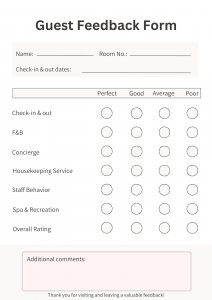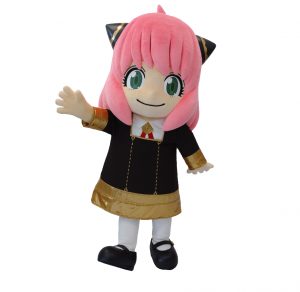Customer satisfaction ratings are important, but they are not always sufficient. Mystery shopping evaluations can be a useful tool in some cases.
MADRID, SPAIN, July 17, 2023/EINPresswire.com/ — The concept of mystery shopping has been around for centuries, with even royalty using it to gain insight into their kingdoms. However, for those in the hotel industry, determining whether it will benefit their business is crucial.
A well-designed mystery shopping evaluation program can assist hotels in determining whether their standard operating procedures (SOPs) and brand standards are being adhered to at the ground level. However, some may question the effectiveness of such a program when daily customer satisfaction ratings are already being gathered. Additionally, in today’s age of social media and online customer reviews, some may question the necessity of relying on a mystery shopper.
Mystery Shopping Evaluation Vs. Customer Satisfaction Ratings
Customer Satisfaction Ratings
A hotel business might want to learn if its customers are overall happy with the product and services being offered. Also, whether the staff is closely following the SOPs and brand standards and behaving as well as they should with the customers also needs to be checked. Furthermore, it is also essential to determine whether the training protocols are in sync with ideal scenarios and whether the staff can deal with everyday customer queries and complaints. The goal, after all, is to guarantee guest satisfaction and boost business. In this, customer satisfaction ratings, although considered highly reliable, are not the best source for the kind of information one looks for.
Firstly, online customer reviews and ratings can sometimes be biased and easily bought. So they may or may not be completely reliable. Secondly, if the feedback is being asked for physically at the property, it is usually done at the checkout. Sometimes verbally and sometimes through a form, whatever the mode. But is it certain that the staff is taking feedback from the customers and honestly noting them down for it to be ultimately relayed to the top?
Also, at the checkout, the customers are usually in a hurry as they have other places to be and flights or trains to catch. They may not have enough time to be completely descriptive about their bad or good experiences. On the other hand, the front desk staff may actually politely ask customers to leave feedback online. But once a customer leaves the property — unless they have had an out-of-the-world experience — they may just forget to give any rating or feedback for the hotel online.
Moreover, even if the hotel were to be able to take complete feedback from each customer, the next ideal step would be to gather feedback and data and evaluate it. Generally, feedback forms are not very long, and each customer has a very subjective approach to filling them out. However, evaluating their experience on certain superficial factors and dynamic ratings is possible. For example, you can ask your guests to rate their experience department-wise, as in the picture.
It may not be possible to guess what went right or wrong simply based on the ‘Perfect’ or ‘Poor’ ratings.
Such customer feedback can help discover a pattern of right or wrong but not point at what to fix. Gathering enough responses can help one create a graph, but it will not be comprehensive enough to take the right action.
Also, considering the comments the customers would leave, they may be too varied to find a pattern or any actionable insight. Every comment may be different from the other and may not depict true reality, or worse, be out of context.
Albeit, customer feedback and satisfaction ratings are undoubtedly essential tools. But there may be circumstances when they are not actionable and require leaping steps further.
Mystery Shopping Evaluation Program
In the simplest terms, a mystery shopping evaluation program is a more advanced form of collecting customer feedback, and they have proven to be effective in analyzing service quality.
Mystery shoppers are trained secret customers sent to stay at a hotel and observe and experience its offerings to make a descriptive-analytical report. They evaluate all agreed-upon standards and give a detailed summary of their experiences. Consistent mystery shopping can help a business gather in-depth templatized information that can easily be analyzed to take appropriate action.
Disguised as real customers, mystery shoppers ensure to collect crucial insights as well as photographic and audio evidence as regular customers experience at a hotel. Through their reports and suggestions, one can spot the loopholes in the services and adherence to the SOPs. They make notes of every negative and positive observation and chart ratings.
In a way, the hotel’s management and R&D team get customer ratings, but they are in the exact shape and numbers needed for a methodical analysis. While one cannot give a long list of questions to actual customers, mystery shoppers can be given long pages of questions to answer, which they answer meticulously as part of the job. Moreover, mystery shoppers are trained to spot the flaws and gaps in services at hotels and hence can draw out better conclusions than average customers.
Mystery shoppers have an eye for detail; they even make out situations that can turn problematic for customers in the future (for example, the bad attitude of (an) employee(s) that may not be too bad at present but may worsen with time, or lapses in cleanliness and hygiene by looking for hidden dirty areas that may go unnoticed for months by usual customers).
Customer feedback, most of all, can be skewed; mystery shopping audits are designed to consistently evaluate particular standards in detail to get a view of both the ground and the underground of operations.
Conclusion
All said and done, the final call about whether to invest in a mystery shopping evaluation program is the management’s. It’s obvious that a mystery shopping evaluation program requires money, time, and effort, while customer satisfaction ratings are practically free of cost. If measuring customer satisfaction ratings is not sufficient in enhancing customer experience and service quality, investing in a mystery evaluation program, after all, may be a game-changer for a hotel business.
Hospitality Connoisseurs OÜ
Guest Delight International
email us here
+34 91 1238638
Visit us on social media:
Twitter
LinkedIn
![]()
Originally published at https://www.einpresswire.com/article/644783854/why-have-a-mystery-shopping-evaluation-program-when-hotels-rate-customer-satisfaction-daily




